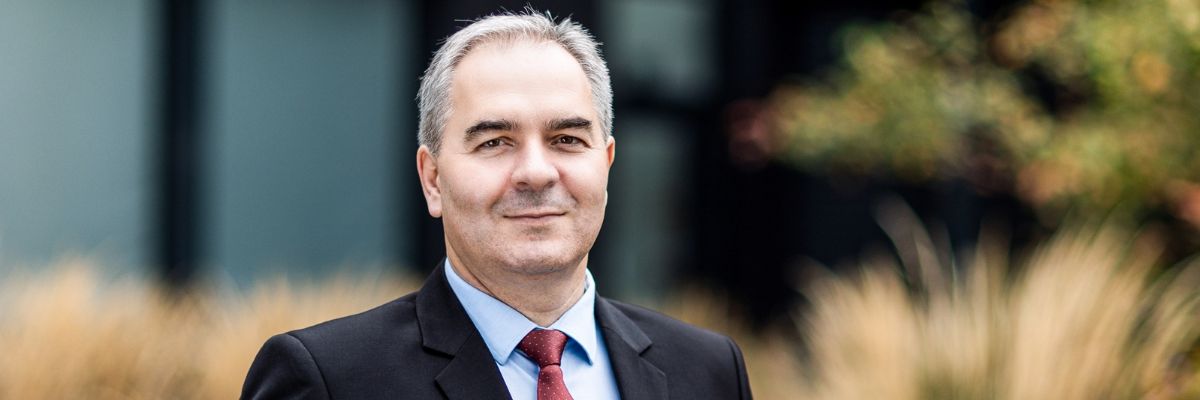
Radomír Pánek: The Academy must be united, strong, and proactive
26. 03. 2025
Just before turning fifty, he became the youngest President of the Czech Academy of Sciences in six decades. Radomír Pánek, who spent ten years leading the Tokamak Department at the Institute of Plasma Physics of the CAS, and then another decade as the institute’s director, has extensive experience in managing international institutions. Though he isn’t planning any revolutions during his first term as President, he does intend to significantly strengthen the Academy’s ties with the public sector. “We need to show that the Academy’s role in our society is vital,” Pánek says. Why does the physicist know Forrest Gump by heart and how does he feel about stepping into the unknown?
*
What was your favorite toy as a child?
Definitely toy cars. Ever since I was a kid I was drawn to technical toys. Back in the 1980s [in Czechoslovakia], the selection wasn’t all that great, but these were usually cars that I’d immediately take apart to find out how they worked. And sometimes I’d even manage to put them back together. Well, sometimes I couldn’t… and sometimes I ended up with a few extra parts. (laughter)
Did you also happen to build paper models?
Of course! Ábíčko [officially named ABC – a popular science and technology magazine for youth] and putting together paper models were my thing. That is, when you could get your hands on the magazine – not exactly an easy feat back then. It was the type of under-the-counter thing you had to know the right people to get – at least in South Moravia.
When I was preparing for this interview, I found out that in 2019, Ábíčko published a cut-out model of the Golem tokamak. Honestly, it didn’t look that great.
Well, to be fair, neither does the real thing. (laughter) It’s over fifty years old, after all.
Tokamaks, nuclear fusion… There’s an old joke floating around that no matter when you ask a scientist when a fusion power plant will be ready, the answer is always “in fifty years.”
That quip has its roots in the 1960s when plasma physics research was developing rapidly. Based on the limited knowledge available at the time, people assumed it would be possible to build plants quickly and relatively easily. However, it turned out that nature was putting up quite a fight. Every decade since then brought with it a major challenge we’ve had to overcome, but we’ve already managed to solve the key ones. We’re now very close to the commercial phase, but the big questions at the moment are: Where will the first fusion power plant prototype be built? Who is going to fund this massive investment? At this point, it’s less about science and more about political decisions.
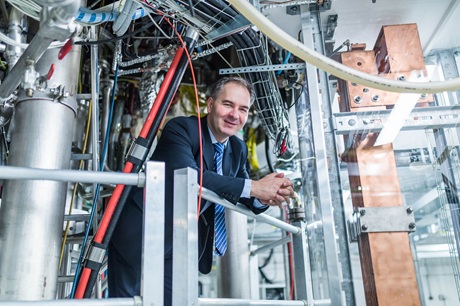
Radomír Pánek’s scientific work focuses primarily on fusion device technology, interactions of waves with plasma, edge plasma physics, and the development of advanced plasma diagnostics.
Speaking of decisions, what led you to run for President of the Czech Academy of Sciences (CAS)?
My ten-year term as director of the Institute of Plasma Physics of the CAS was coming to an end. I had been invited to apply for the position of Director of the European research organization Fusion for Energy in Barcelona, which I ultimately decided not to pursue, mainly for family reasons. However, I had been planning to run for the Academy Council of the CAS so I could contribute my experience in science management from the past twenty years to the Academy as a whole. Then several directors of CAS institutes approached me directly, asking if I would consider running for the position of President of the CAS instead, which took me by surprise a bit. But after a few sleepless nights and some hesitation, I decided to go for it.
Did your wife try to talk you out of it? After ten years as director of a research institute, did she want you to stay home instead?
Not really. She knew it would be pointless once I had made up my mind.
What about your kids? Will they follow in their mother’s footsteps as teachers, or yours as scientists?
Hard to say. So far, it doesn’t look like they’ll be scientists – I might have scared them off a bit. Though my daughter is in her third year of high school and has really gotten into chemistry. They have a teacher who is clearly passionate about the subject and makes the classes engaging. As for my son? No idea yet. He’s mostly into computers, like a lot of boys his age. But he’s only in eighth grade, so we’ll see.
Since we’re talking about kids, here’s a different kind of question: If you could choose to be any famous superhero, who would it be?
Oh, wow. I don’t really know them that well. I’ve taken my kids to go see a few Marvel movies, of course, but it’s not really my cup of tea. Same with Harry Potter – I can take it or leave it, but my kids could binge-watch it all day long. One of my all-time favorite movies is Forrest Gump. I’ve seen it countless times, even in all sorts of different languages. By now I basically know it by heart. If I’m ever on a work trip and I come across it on TV at the hotel, I’ll watch it in whatever language they’re showing it in – even Chinese. (laughter)
You’ve visited a fair number of countries. Is traveling something you enjoy?
I travel so much for work that I’m not really a fan of typical family vacations abroad – which, of course, isn’t exactly something my family wants to hear. But we always manage to find a compromise.
|
EITHER–OR with Radomír Pánek Sports – actively or on TV? Sushi or fried cheese? Mozart or Metallica? |
The art of compromise will surely come in handy in your new role. Were you nervous before the election at the Academy Assembly? After all, there was an unusually high number of candidates.
I definitely felt a bit nervous. When you put yourself out there in this way, you want it to go well. Of course, after the results were announced, it was a huge relief.
You won with a fairly narrow majority but secured victory in the first round, which many didn’t expect. How strong of a mandate is that?
I consider it a strong mandate. It’s very important that the Academy was able to agree on a single candidate in the first round.
Before the election, there was a lot of talk about continuity. What will change under Radomír Pánek’s leadership?
The Czech Academy of Sciences is a complex system, and big revolutions rarely bring much benefit. Rather than radical cuts, what we need is evolution. Besides, the CAS President’s powers aren’t so extensive that they could single-handedly implement a revolution. That said, I do think some things need to change – such as updating the law governing the Academy, which is over thirty years old and doesn’t reflect today’s environment. We also want to focus on employee renumeration and significantly support knowledge and technology transfer. I recently met with the leadership of the Confederation of Industry of the Czech Republic, and it was clear that our collaboration is off to a great start, and we need to continue developing it. Policymakers are very interested in technology transfer – already on the day I was appointed, the President of the Czech Republic asked me how we cooperate with industry and how we can strengthen this area to benefit the Czech economy.
You also emphasized fostering relations with the political sphere in your election program, if I’m not mistaken.
Exactly. I want the leadership of the Academy to be much more active in engaging with politicians. I’d like the Academy to become a key partner for public administration – to be a source of impartial, scientifically grounded information for the Czech Parliament, government, President, and other state representatives in their decision-making. I would be very pleased if it once again became customary for the CAS President to be a regular guest at parliamentary sessions. That would also highlight the Academy’s importance within the system – something that, unfortunately, has somewhat declined. We need to show that our role in society is vital.
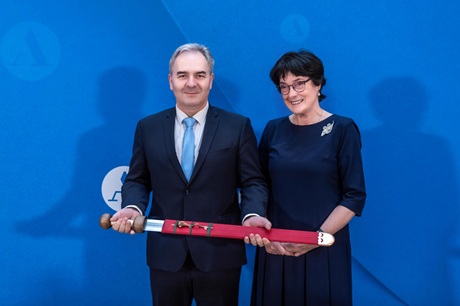
On 24 March 2025, Radomír Pánek replaced Eva Zažímalová as President of the Czech Academy of Sciences.
So, the plan is to provide the Czech government, members of Parliament, regional governors, and others with more expert opinions?
Above all, we need to ensure that these expert opinions reach the right people. They shouldn’t get stuck somewhere at the level of clerks and civil servants at the ministries – they need to be seen by the actual decision-makers. There has to be much closer, tight-knit cooperation between the Academy, the government, and Parliament. While we do have formal memoranda of agreement in place, in practice, they don’t work in an ideal way.
Expert opinions don’t have to be directed at politicians only. The information can also be communicated to the public – who can then put pressure on their political representatives to promote evidence-based policy.
I agree. In my view, the Academy has made considerable progress in science communication in recent years. What we should focus on more actively is building the Academy’s brand as a whole, rather than just our individual research institutes. That is something I’d like to discuss with the Academy Council. The negotiating power of fifty-four separate entities will never match that of a single, unified institution.
What about internal communication? That’s also something you emphasized in your program.
Communication between the leadership of the Academy and the directors of its institutes has improved significantly over the past four to six years, but we still need to intensify it – and perhaps even make it less formal. Communicating with other employees is, of course, much more complicated because we currently lack a functional platform for it. That’s something we need to reevaluate.
You will be the first President of the post-1989 Czech Academy of Sciences who was not previously a member of the Academy Council. That could be both an advantage – you’re not bound by past practices – and a disadvantage.
Since December 2024, when the Academy Assembly elected me as the presidential candidate, I’ve been attending meetings of the Academy Council and its presidium to get an idea of its current operations. However, I don’t want to be completely influenced by that alone. I have experience managing large international organizations in Europe, and I’d like to bring some of that experience to the workings of the Academy Council and the Head Office of the Academy.
You mentioned employee renumeration. What can the Academy actually do for its personnel? It is an umbrella institution of over fifty independent research institutes – it seems like the only real option is to funnel more funding their way. But that money has to come from somewhere.
There is no doubt that we need to work on increasing funding for the Czech Academy of Sciences. However, independently of that, I also want to take a closer look at wage policies. The current system gives the CAS institute directors a lot of flexibility, but at the same time, it leads to significant disparities in salaries between various institutes and fields of science.
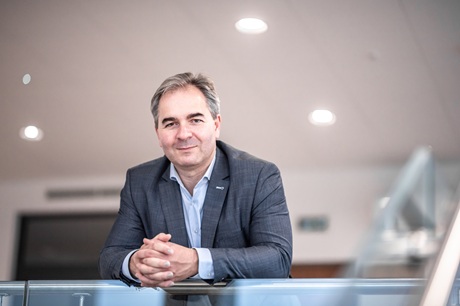
Radomír Pánek also wants to focus on securing stable funding for the CAS institutes.
Speaking of renumeration, what would you like for your upcoming fiftieth birthday?
My wife has already asked me that, and I still don’t have an answer. (laughter)
I guess a trip around the world is out of the question…
That’s off the table. I’d be happy if my tenure at the Academy proves to be positive and beneficial. But that’s not something you can get as a birthday present – that’ll only become clear much later on. Honestly, I haven’t had time to think about my fiftieth birthday at all.
And what about the possibility of someone from the Academy winning a Nobel Prize during your presidency?
I firmly believe we do have suitable candidates, but politics plays a huge role in Nobel Prize decisions – not just at the level of research institutions, but also at the state/country level. Still, I understand that for the public, it would be a clear indicator of Czech scientific success.
I assume that for the scientific community, a more relevant measure of success is the number of ERC grants secured.
Absolutely. That’s something we need to improve. But to increase the number of ERC grants, we first need to increase the number of applications. I want to discuss this with CAS institute directors, how we can provide more support in this area. I think one of the main issues is that we’re not proactive enough. For many researchers, it’s much easier to apply for funding from the Czech Science Foundation or the Technology Agency of the Czech Republic.
Why is that? Is it just the Czech mentality?
There might be some truth to that. We tend to be conservative and more cautious about taking bigger leaps into the unknown. But taking that leap is something I personally have no trouble with.
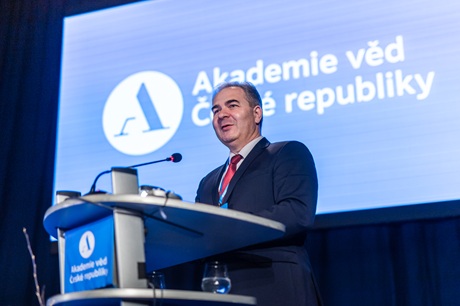
Radomír Pánek was elected President of the Czech Academy of Sciences in December 2024 at the 64th Academy Assembly.
That’s evident – and you will be the youngest President of the Academy since 1962. Do you see your age as an advantage?
I see it as a plus. I have the energy and stamina to dedicate myself fully to the Academy. And I believe I have the courage to implement meaningful changes. Recently, though, this seems to be becoming a broader trend – if you look at Czech university rectors, many of them are relatively young as well.
If I’m not mistaken, you don’t live in Prague. How do you plan to manage that? Does it worry you?
Not at all. I’ve found a specific rhythm to this that I’ve been following for more than ten years. It won’t be a significant change for me. We have a house in the Chrudim region, but I usually stay in Prague during the workweek. That allows me to dedicate myself to work from early morning until late at night. The downside is that my wife has to take care of most other – household and childcare – responsibilities in the meantime.
Living outside of Prague also allows you to pursue your big hobby – gardening.
Yes, working in the garden is how I truly relax and clear my head. Rather than going to the gym or pedaling on a stationary bike, I prefer to spend my time gardening. I grow various plants and trees, even though I don’t always eat their fruit. Sometimes I feel like a fisherman who loves to fish but doesn’t eat the fish. It simply makes me happy to watch plants grow.
|
Prof. RNDr. Radomír Pánek, Ph.D. Radomír Pánek studied at the Faculty of Mathematics and Physics at Charles University in Prague and has been working at the Czech Academy of Sciences since 2000. His research field is plasma physics and thermonuclear fusion. From 2015 to 2025, he served as Director of the Institute of Plasma Physics of the CAS. Pánek is a member of the scientific councils of several universities and has held top management positions at the European research agency Fusion for Energy in Barcelona and the European scientific consortium EUROfusion. He has experience in negotiating with partners from Czech and international industries alike, representatives of the Czech government, and the European Commission. |
Written and prepared by: Viktor Černoch, External Relations Division, CAO of the CAS
Translated by: Tereza Novická, External Relations Division, CAO of the CAS
Photo: Jana Plavec, External Relations Division, CAO of the CAS; Pavlína Jáchimová, External Relations Division, CAO of the CAS
 The text and photos are released for use under the Creative Commons license.
The text and photos are released for use under the Creative Commons license.
Read also
- New record set for neutrino mass: one million times less than an electron
- On the trail of the endangered little owl: searching for newly hatched owlets
- Teen scientist breaks barriers: No child is a lost cause
- The Czech Academy of Sciences has appointed its new leadership for 2025–2029
- Literature is tied to its historical context. How can we read between the lines?
- A springtime booster: The healing potential of tree buds
- A novel compound that protects bone cells may benefit diabetic patients
- New interactive exhibition at the CAS showcases materials shaped by genius ideas
- Leaf growth, root formation, and reproduction – Look to hormones for the answer
- Without volcanoes, life on Earth wouldn’t exist, says Lukáš Krmíček
The Czech Academy of Sciences (the CAS)
The mission of the CAS
The primary mission of the CAS is to conduct research in a broad spectrum of natural, technical and social sciences as well as humanities. This research aims to advance progress of scientific knowledge at the international level, considering, however, the specific needs of the Czech society and the national culture.
President of the CAS
Prof. Eva Zažímalová has started her second term of office in May 2021. She is a respected scientist, and a Professor of Plant Anatomy and Physiology.
She is also a part of GCSA of the EU.